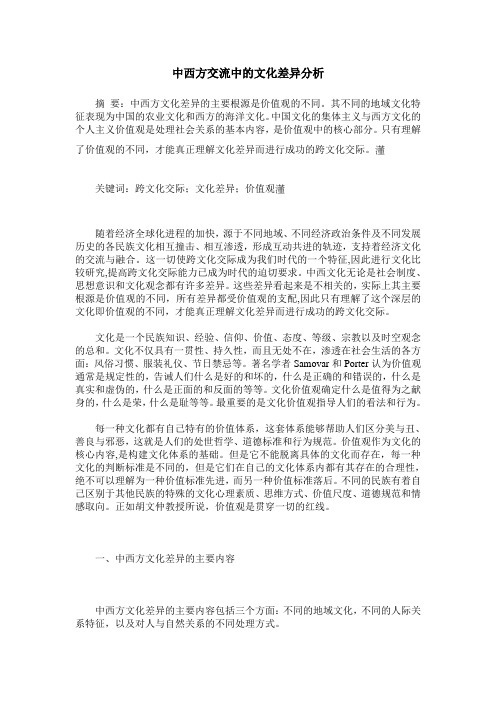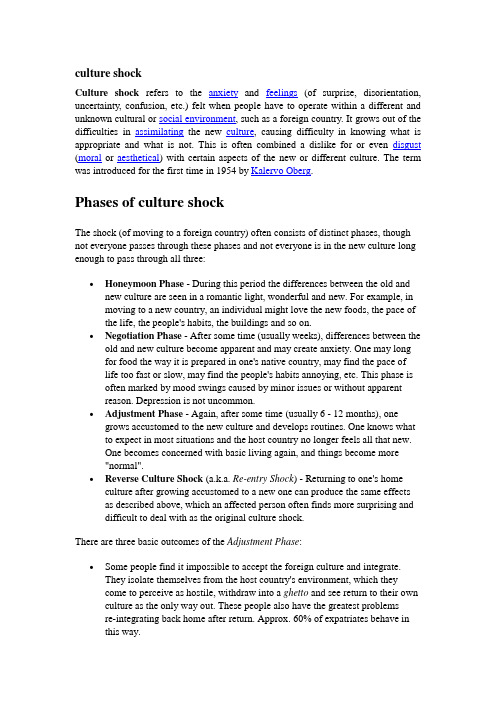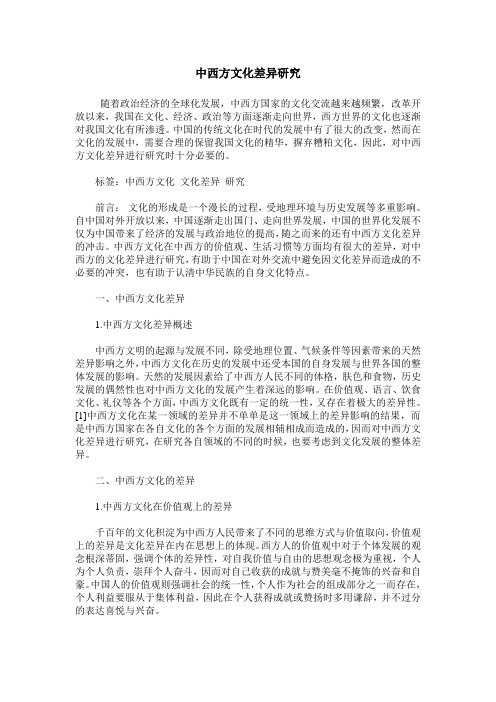中西方文化差异cultureshock解读
英语Culture_shock课件ppt课件

• 点评:这图是说我们中国人喜欢尝试新事 物吗,老外则与新事物保持一定的距离? 如果是这样的话,我想,还是那四个字: 不敢苟同。其实,中国人在对待新事物上 面,还是(我认为)非常保守的。
11、胃痛时的饮品
• 点评:我们中国人最讲究的不一定是科学, 而是老祖宗传下来的话。那就是胃痛时要 至少喝点热的。至于为什么?那得问我们 的中医去。他们的学问,那真是“话到嘴 边留半句”,深奥着呢。
12、旅游时
• 评:其实,这有些冤枉我们中国人。毕竟 我们中国人才富裕起来几年啊,终于可以 像小日本儿那样了,走到哪里都拍照了。 另外,中国人喜欢的不是思考生命的意义, 而是“到此一游”的意义。毕竟,有照片 可以说明俺老兄到过什么什么地方了。尤 其是去了国外,则更是要用照片说明。
1、表达个人观点时
• 点评:中国人在表达个人观点时,总喜欢拐弯抹 角。“是”时不说“是”,却说“不是”。“不 是”时不说“不是”,却总说“是”。生活中发 生的实际状况。并且,最有趣的是,一个中国人 如果像那老外那样直来直去地说出自己的观点的 话(如上图所示),则会被认为“没有城府”, 属于“直肠子”,是要吃亏的。事实上,中国人 的处事哲学中最重要的一点就是“话到嘴边留半 句”。因此,在老外眼中来看,中国人表达意思 时,总令他们费解。
9、聚会
• 点评:老外永远不会明白为什么中国人那 么喜欢过春节了,也永远闹不明白为什么 中国话里的“团圆”代表着多么深厚的文 化意涵。说他们没文化,我举双手赞成。 而他们却永远是在我们过团团圆圆的节日 聚会时,一个人跑到什么地方去感受一下 什么“生命的意义”去了。看看那巨大的 “圆”,这不正是一个最好的中国文化 “图腾”吗?我们中国人要什么?不就是 要个团圆么!
18、洗澡时间
• 点评:一看这老外就不太懂中国人的生活 习惯。要知道,晚上洗澡之后再睡觉,那 是一件多么愉悦的事情。而你老外白天当 不当正不正地洗哪门子澡呢。不懂生活。 另外,咱们中国人还有大多数的农民,他 们的洗澡时间,我想,绝对不是你老外能 弄明白的,小样。
culture shock 文化差异(课堂PPT)

For others… Cultural differences result in discomfort and confusion, they tend to judge or evaluate other people and places and reach negative conclusions.
UQ Abroad Presentation Semester Two, 2012
1 .The Definition of Culture
SAMPLE
Culture shock isSahposycckhological phenomenon
that is experienced most often by those who, whether voluntarily or involuntarily, in the process of adjusting themselves to a new culture. It is the trauma of bewilderment (困 惑、紧张)which people find themselves in when they are isolated in an alien culture.
Name of presentation Month 2008
2. Phases of Culture Shock:
SAMPLE
Honeymoon phase Negotiation phase Adjustment Phase Mastery Phase
文化冲击

文化冲击微探析随着社会的发展,越来越多的人选择到国外留学、工作、旅游或移民,出国似乎成为了一种潮流和时尚。
而伴随这一现象产生的引人思考的问题之一就是文化冲击。
尽管选择海外留学、工作将是一番新的人生经历,从中会有新的机遇,获得一种某种程度上而言的自由感,但同时也意味着客居他乡,身处陌生的文化氛围,会遇到由文化产生的各种冲击。
什么是文化冲击?为什么会产生文化冲击?一、文化冲击的定义“Culture Shock”,文化冲击,又叫文化震惊、文化休克。
这一术语是瑞典学者卡尔维罗·奥博格大约50年前造出来的。
其拓荒之作《文化冲击:适应新的文化环境》为许多教科书及杂志所再版和修订。
他称之为“突然移居海外的人所患的职业病”。
他用“disease”这个词是个双关语,因为它暗示这如同一种“病”,有其自身的症状和疗法,而且其是一种(dis)不(ease)适或心神不宁的感觉。
文化冲击是一个很学术化的词汇,原意是指一个人从其固有的文化环境中移居到一个新的文化环境中所产生的文化上的不适应。
二战后,随着人口的大量流动,产生了大批的移民,他们从一个国家移居到一个新的国家,从一种文化背景移居到新的文化背景,等待他们的是诸多跨文化的社会心理问题,文化冲击这个词就应运而生了。
文化冲击可以是多方面的,从气候、饮食、语言、服饰,直至行为举止、人口密度、政治经济环境等等。
在一个崭新的文化环境中,文化冲击使得受冲击者无所适从,甚至整个心理平衡和价值判断标准完全丧失。
二、文化冲击的主要表现文化冲击主要是由于两个不同文化差异引起的,可以发生在任何时候和新环境,选择国外留学,生活的人普遍都会体验到文化冲击,当他们身处新的环境,会觉得很陌生、困惑,不知道自己的角色是什么,如何给自己定位,应该怎么表现才恰当等等,觉得很不舒服,很不自在时,就是“shock”(冲击)。
通常,文化冲击会引起一些身体上的不适,如:头痛、胃囗不好、情绪低落、不安、睡眠失调。
文化冲击

文化冲击微探析随着社会的发展,越来越多的人选择到国外留学、工作、旅游或移民,出国似乎成为了一种潮流和时尚。
而伴随这一现象产生的引人思考的问题之一就是文化冲击。
尽管选择海外留学、工作将是一番新的人生经历,从中会有新的机遇,获得一种某种程度上而言的自由感,但同时也意味着客居他乡,身处陌生的文化氛围,会遇到由文化产生的各种冲击。
什么是文化冲击?为什么会产生文化冲击?一、文化冲击的定义“Culture Shock”,文化冲击,又叫文化震惊、文化休克。
这一术语是瑞典学者卡尔维罗·奥博格大约50年前造出来的。
其拓荒之作《文化冲击:适应新的文化环境》为许多教科书及杂志所再版和修订。
他称之为“突然移居海外的人所患的职业病”。
他用“disease”这个词是个双关语,因为它暗示这如同一种“病”,有其自身的症状和疗法,而且其是一种(dis)不(ease)适或心神不宁的感觉。
文化冲击是一个很学术化的词汇,原意是指一个人从其固有的文化环境中移居到一个新的文化环境中所产生的文化上的不适应。
二战后,随着人口的大量流动,产生了大批的移民,他们从一个国家移居到一个新的国家,从一种文化背景移居到新的文化背景,等待他们的是诸多跨文化的社会心理问题,文化冲击这个词就应运而生了。
文化冲击可以是多方面的,从气候、饮食、语言、服饰,直至行为举止、人口密度、政治经济环境等等。
在一个崭新的文化环境中,文化冲击使得受冲击者无所适从,甚至整个心理平衡和价值判断标准完全丧失。
二、文化冲击的主要表现文化冲击主要是由于两个不同文化差异引起的,可以发生在任何时候和新环境,选择国外留学,生活的人普遍都会体验到文化冲击,当他们身处新的环境,会觉得很陌生、困惑,不知道自己的角色是什么,如何给自己定位,应该怎么表现才恰当等等,觉得很不舒服,很不自在时,就是“shock”(冲击)。
通常,文化冲击会引起一些身体上的不适,如:头痛、胃囗不好、情绪低落、不安、睡眠失调。
中西方交流中的文化差异分析

中西方交流中的文化差异分析摘要:中西方文化差异的主要根源是价值观的不同。
其不同的地域文化特征表现为中国的农业文化和西方的海洋文化。
中国文化的集体主义与西方文化的个人主义价值观是处理社会关系的基本内容,是价值观中的核心部分。
只有理解了价值观的不同,才能真正理解文化差异而进行成功的跨文化交际。
关键词:跨文化交际;文化差异;价值观随着经济全球化进程的加快,源于不同地域、不同经济政治条件及不同发展历史的各民族文化相互撞击、相互渗透,形成互动共进的轨迹,支持着经济文化的交流与融合。
这一切使跨文化交际成为我们时代的一个特征,因此进行文化比较研究,提高跨文化交际能力已成为时代的迫切要求。
中西文化无论是社会制度、思想意识和文化观念都有许多差异。
这些差异看起来是不相关的,实际上其主要根源是价值观的不同,所有差异都受价值观的支配,因此只有理解了这个深层的文化即价值观的不同,才能真正理解文化差异而进行成功的跨文化交际。
文化是一个民族知识、经验、信仰、价值、态度、等级、宗教以及时空观念的总和。
文化不仅具有一贯性、持久性,而且无处不在,渗透在社会生活的各方面:风俗习惯、服装礼仪、节日禁忌等。
著名学者Samovar和Porter认为价值观通常是规定性的,告诫人们什么是好的和坏的,什么是正确的和错误的,什么是真实和虚伪的,什么是正面的和反面的等等。
文化价值观确定什么是值得为之献身的,什么是荣,什么是耻等等。
最重要的是文化价值观指导人们的看法和行为。
每一种文化都有自己特有的价值体系,这套体系能够帮助人们区分美与丑、善良与邪恶,这就是人们的处世哲学、道德标准和行为规范。
价值观作为文化的核心内容,是构建文化体系的基础。
但是它不能脱离具体的文化而存在,每一种文化的判断标准是不同的,但是它们在自己的文化体系内都有其存在的合理性,绝不可以理解为一种价值标准先进,而另一种价值标准落后。
不同的民族有着自己区别于其他民族的特殊的文化心理素质、思维方式、价值尺度、道德规范和情感取向。
Culture_shock

culture shockCulture shock refers to the anxiety and feelings(of surprise, disorientation, uncertainty, confusion, etc.) felt when people have to operate within a different and unknown cultural or social environment, such as a foreign country. It grows out of the difficulties in assimilating the new culture, causing difficulty in knowing what is appropriate and what is not. This is often combined a dislike for or even disgust (moral or aesthetical) with certain aspects of the new or different culture. The term was introduced for the first time in 1954 by Kalervo Oberg.Phases of culture shockThe shock (of moving to a foreign country) often consists of distinct phases, though not everyone passes through these phases and not everyone is in the new culture long enough to pass through all three:∙Honeymoon Phase - During this period the differences between the old and new culture are seen in a romantic light, wonderful and new. For example, inmoving to a new country, an individual might love the new foods, the pace ofthe life, the people's habits, the buildings and so on.∙Negotiation Phase - After some time (usually weeks), differences between the old and new culture become apparent and may create anxiety. One may longfor food the way it is prepared in one's native country, may find the pace oflife too fast or slow, may find the people's habits annoying, etc. This phase isoften marked by mood swings caused by minor issues or without apparentreason. Depression is not uncommon.∙Adjustment Phase - Again, after some time (usually 6 - 12 months), one grows accustomed to the new culture and develops routines. One knows whatto expect in most situations and the host country no longer feels all that new.One becomes concerned with basic living again, and things become more"normal".∙Reverse Culture Shock (a.k.a. Re-entry Shock) - Returning to one's home culture after growing accustomed to a new one can produce the same effectsas described above, which an affected person often finds more surprising anddifficult to deal with as the original culture shock.There are three basic outcomes of the Adjustment Phase:∙Some people find it impossible to accept the foreign culture and integrate.They isolate themselves from the host country's environment, which theycome to perceive as hostile, withdraw into a ghetto and see return to their own culture as the only way out. These people also have the greatest problemsre-integrating back home after return. Approx. 60% of expatriates behave inthis way.∙Some people integrate fully and take on all parts of the host culture while losing their original identity. They normally remain in the host country forever.Approx. 10% of expatriates belong to this group.∙Some people manage to adapt the aspects of the host culture they see as positive, while keeping some of their own and creating their unique blend.They have no major problems returning home or relocating elsewhere. Approx.30% of expatriates are these so-called Cosmopolitans.Coping with culture shockThis article or section contains instructions, advice, or how-to content.The purpose of Wikipedia is to present facts, not to teach subject matter. Please help improve this article either by rewriting the how-to content or by moving it to Wikiversity.Experience makes it easier to cope with the difficulties of relocation. Some common strategies used to make the transition easier are:[2]:∙Learning about the country and its culture before departing: E.g. reading, studying the language or attending cultural classes. This way, the country andits people are more familiar upon arrival, one is more aware of differences and better prepared to deal with them.∙Avoiding offence: Trying to not be offended, not offend locals, or be entangled in cultural misunderstanding.∙Being open-minded about the culture one visits and tolerant / accepting of its unfamiliar aspects.∙Taking a 'time out' or rest apart from cultural exchange in order to reduce the 'shock' of adjustment.Some intercultural communication researchers claim that culture shock has many positive effects on intercultural sojourners, like increasing self-efficacy[3] and helping improve self-motivation.Kalervo Oberg (1901-1973) was a world-renowned anthropologist. Oberg was dedicated to fieldwork, serving as a civil servant and a teacher. He traveled the world and wrote about these experiences so others could enjoy them as well.Born to Finnish parents in British Columbia, Canada, Oberg is perhaps best knownfor applying the term culture shock to all people who travel abroad into new cultures and for his doctoral dissertation, The Social Economy of the Tlingit Indians of Alaska. 主要经历四个阶段发生“文化休克”的过程大体经历四个阶段:蜜月阶段、沮丧阶段、恢复调整阶段和适应阶段。
中西方文化差异研究

中西方文化差异研究随着政治经济的全球化发展,中西方国家的文化交流越来越频繁,改革开放以来,我国在文化、经济、政治等方面逐渐走向世界,西方世界的文化也逐渐对我国文化有所渗透。
中国的传统文化在时代的发展中有了很大的改变,然而在文化的发展中,需要合理的保留我国文化的精华,摒弃糟粕文化,因此,对中西方文化差异进行研究时十分必要的。
标签:中西方文化文化差异研究前言:文化的形成是一个漫长的过程,受地理环境与历史发展等多重影响。
自中国对外开放以来,中国逐渐走出国门、走向世界发展,中国的世界化发展不仅为中国带来了经济的发展与政治地位的提高,随之而来的还有中西方文化差异的冲击。
中西方文化在中西方的价值观、生活习惯等方面均有很大的差异,对中西方的文化差异进行研究,有助于中国在对外交流中避免因文化差异而造成的不必要的冲突,也有助于认清中华民族的自身文化特点。
一、中西方文化差异1.中西方文化差异概述中西方文明的起源与发展不同,除受地理位置、气候条件等因素带来的天然差异影响之外,中西方文化在历史的发展中还受本国的自身发展与世界各国的整体发展的影响。
天然的发展因素给了中西方人民不同的体格,肤色和食物,历史发展的偶然性也对中西方文化的发展产生着深远的影响。
在价值观、语言、饮食文化、礼仪等各个方面,中西方文化既有一定的统一性,又存在着极大的差异性。
[1]中西方文化在某一领域的差异并不单单是这一领域上的差异影响的结果,而是中西方国家在各自文化的各个方面的发展相辅相成而造成的,因而对中西方文化差异进行研究,在研究各自领域的不同的时候,也要考虑到文化发展的整体差异。
二、中西方文化的差异1.中西方文化在价值观上的差异千百年的文化积淀为中西方人民带来了不同的思维方式与价值取向,价值观上的差异是文化差异在内在思想上的体现。
西方人的价值观中对于个体发展的观念根深蒂固,强调个体的差异性,对自我价值与自由的思想观念极为重视,个人为个人负责,崇拜个人奋斗,因而对自己收获的成就与赞美毫不掩饰的兴奋和自豪。
简述中西方文化差异与大学英语教学

简述中西方文化差异与大学英语教学文化是一个国家或地域的思想、习俗和价值观念的总和,是一个民族社会发展的产物。
中西方文化差异是指中西方文化在思维模式、价值观、习惯、礼仪、行为准则、信仰、语言等方面的差异。
中西文化的差异影响着中西文化的相互理解与交流,也影响着面向外部的大学英语教学。
一、中西方文化差异1、中西方思维方式的差异。
中西方文化都有自身独特的思维模式,中国人喜欢综合背景来解决问题,西方人则更喜欢从个体角度出发探究总体结构来解决问题。
2、中西方价值观差异。
中西方价值观在很大程度上影响着两种文化之间的理解与沟通。
中国人重视道德素质,注重团队合作及个体地位;而西方人更关注独立和个人成就。
3、中西方习惯差异。
中西方在习惯上也存在差异,比如中国人拥抱更多的礼节,以及中西方有关吃饭、穿着等方面的习惯差异。
二、大学英语教学1、教学模式需要考虑文化差异。
针对两种文化的差异,教师需要有不同的教学模式,比如丰富课堂活动,充分结合中西方文化,让学生在接受语言习得的同时也能够接受文化知识。
2、发掘学习者的潜能。
教学中,老师应该把握正确的技巧,根据学生的语言能力及兴趣爱好,发掘学生在跨文化交流中的潜能,让他们自觉地体验及理解他们所处的两种文化之间的差异。
3、自我学习的重要性。
课堂教学是帮助学生学习英语的重要途径,但并不是唯一的学习方式。
学生最好通过积极的自主学习来了解英语,在日常生活中多多体验中外文化差异,从中学习及收获更多乐趣。
总结中西方文化差异在某种程度上影响着外语教学,教师们需要灵活的调整教学模式,根据学生的多样性,发掘学生的潜能,激发学生的学习兴趣,为他们提供一个规范的英语环境,让学生们更好的学习英语,在语言的学习中也接受文化的学习。
- 1、下载文档前请自行甄别文档内容的完整性,平台不提供额外的编辑、内容补充、找答案等附加服务。
- 2、"仅部分预览"的文档,不可在线预览部分如存在完整性等问题,可反馈申请退款(可完整预览的文档不适用该条件!)。
- 3、如文档侵犯您的权益,请联系客服反馈,我们会尽快为您处理(人工客服工作时间:9:00-18:30)。
• Americans are met, would not shake hands, just smile and say hello to go, even meet for the first time, Chinese then see a handshake as a basic decorum. • 美国人见面时,不一 定会握手,只要笑一 笑,打个招呼就行了, 即使是第一次见面, 而中国人则视握手为 一个基本礼节。
H ave you ever th ou gh t abou t you r ow n w ed d i n g d ay?
W hat kin d of w eddin g do you prefer?
C u Cul tur e shock i s a ter m used to descr i be the l anxi ety and feel i ngst ( of sur pr i se, s h u di sor i entati on, confusi on, etc. )fel t w hen o r peopl e have to oper ate w i thi n an enti r el y c e k di ffer ent cul tur e or soci alenvi r onm ent,such
D efi ni ti on: as a di ffer ent countr y.
D o you som eti m es fi nd i t di ffi cul t to adapt to a new envi r onm ent ?
I n fi l ms or i ny our personal experi ences, y ou may h ave found Westerners b eh ave di fferentl y from us Ch i nese.Pl ease gi ve some exampl es to sh ow th e cul ture di fferences.
• • •
•
特别忠告:对病人表示关心, 文化差异:美国人比较看中个人的独立 不必尽提建议。 性。受人照顾往往被视为弱者。给对方 Chinese: You look pale. What's the matter? 可以使用下列句型: ( 1) I' m 出主意或提建议时,不能使对方认为自 American: I'm that feeling sick. A cold, maybe. 己小看他的能力。美国人对上面第一句 sor r y to hear ( you' ve got a bad 话的反应通常是 " Take care of yoursel f. I hope Chinese: Go and see the doctor. Drink col d) .( 2) I hope you' l lbe al lr i ght you' l lwater. be better soon. " 不必教人怎么做。中国 more Did you take any pills? ver y soon. ( 3) Take extr a car e of Would 人则以出主意提建议表示关心,而且以 Chinese medicine works wonderful. your sel f.try? ( 4) That' s too bad. W hat' s 兄弟姐妹或父 母亲人的口吻,或以过来人 you like to Put on more clothes. Have a的口气,这对美国人行不通。 good rest.? ( the m atter 5) H ow ar e you feel i ng American: now ? You are not my mother, are you?
Global reading: Part Division of the Text
Part1 We might call culture shock a disease which is caused 1~3 by the frustration and anxiety resulting from losing all our familiar signs and symbols of social intercourse. Part2 Culture shock is due to our own lack of understanding of other people’s cultural background and our lack of 4~6 the means of communication rather than the hostility of an alien environment. Part3 To get over culture shock, we should get to know the people of the host country and their language; we 7~9 should find out what they do, how they do it, and what their interests are, etc. But understanding the ways of a people does not mean that we have to give up our own.
• Americans tableware is mainly, knife, fork •美国人餐具主要是: and spoon disc, bread, 刀、面包碟、叉、汤 匙、叉匙、酒杯、餐 fork spoon, glass, 巾 napkin
• Chinese ticks and spoons • 中国餐具以筷子和 勺子为主
